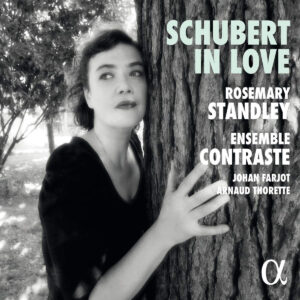Here’s a recording the success of which depends entirely on how you approach it. If you think of it as a classical Lied recital that experiments, you’ll likely regard it as an experiment gone wrong. Come to it as a folk-blues-country-jazz-crooner album (or whatever genre you might associate it with) that happens to pay homage to Schubert–or better still, with no expectation whatsoever–it might just tickle you in all the right places.
Rosemary Standley and Ensemble Contraste provide a traversal that traipses through Schubertian favorites, starting with the Ständchen’s Leise flehen meine Lieder via Heidenröslein and Tod und das Mädchen to Du bist die Ruh. Theirs are wildly individualistic takes on these songs; Johan Farjot’s arrangements (for viola, cello, double bass, guitar, percussion, piano, and sometimes trumpet) are attention-grabbing but somehow sound spectacularly organic and suited to the songs.
Standley’s take might be more startling at first: For starters, her German is so heavily accented, for a moment I thought she was singing in Spanish. Then I thought it might be put on. It isn’t; it is simply accented, “mimicked” German. That would be a turn-off in a “proper” recital of Lieder, but that’s where the qualifier I mentioned above comes in. Because in this exotically arranged version of Schubert songs, which includes several vaguely Andalusian vibes (not the least thanks to Kevin Seddiki’s enchanting guitar playing), Standley’s contribution becomes part of the colorful, sometimes outlandish, certainly striking fabric.
It might also help to know who Rosemary Standley is: a French-American chanteuse, guitarist and singer of the band Moriarty. Classically trained, granted, once upon a time, but not a “classical singer” in any conventional sense. She’s not shy about that; that’s not what the album is about. And the difference is flaunted in the terrific back and forth (and then duet) with the great Sandrine Piau (a touch on the dramatic side, here) in Heidenröslein.
The interludes–instrumental improvisations on the Arpeggione and the Unfinished Symphony–sound as though Diana Krall’s band was moonlighting at the local Schubert-themed hotel bar. In a good way, that is. The equally instrumental G-flat major Andante from the Four Impromptus D. 899 gives cellist Antoine Pierlot a moment in the sun, making it sound as though it had always meant to be a cantilena for cello and piano accompaniment. The incorporation of what sounds like tabla-supported samba rhythms (Trockne Blumen) is catchy; the jazzy number that the Ave Maria becomes has a loungy groove to it. It’s funky on first listening. On tenth listening, it becomes obvious how sneaky-good this whole album really is!
































